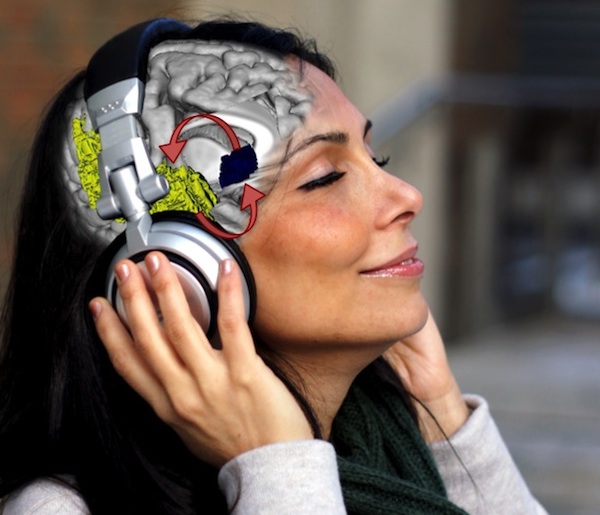Revealed: The Part of Our Brains That Makes Us Like New Music
Imaging technology shows that a reward center known as the nucleus accumbens lights up when we hear melodies we love

A reward center known as the nucleus accumbens (shown in dark blue) is most closely associated to the pleasure we get from listening to new music. Image via Peter Finnie and Ben Beheshti
The link between music and pleasure runs deep. A desire to make and listen to music is found in virtually every culture around the world, and dates back at least 43,000 years, when a Cro-Magnon in Europe pierced holes into a bear bone, creating a flute that has become the world’s oldest surviving musical instrument. There are good reasons music is so universal: Experiments have shown that our brains’ reaction to hearing favorite music most closely resembles what happens after we take psychoactive drugs or eat good food.
Now, neuroscientists are digging deeper into the neural patterns responsible for the fact that we love music so much. A new study published today in Science pinpoints the part of the human brain that makes new music in particular so pleasurable, showing that activity in the nucleus accumbens—located near the organ’s center and shown in dark blue in the image at top—is most closely linked to our enjoyment of a new tune. It also reveals that a second area (in the auditory cortex, shown in yellow) is involved, encoding preferences based on the music we hear over time, making it more likely that we’ll enjoy new songs that resemble those we’ve already heard.
The research team, led by Valorie Salimpoor of McGill University, came to the finding by using functional MRI (fMRI) technology, which measures blood flow to each part of the brain in real-time and is frequently used in neuroscientific inquiry. The neural activity of 19 participants was recorded as they listened to 60 songs they’d never heard before while lying in a fMRI scanner.
To specifically look into brain activity exhibited while people listened to new music they liked, though—rather than any new music at all—the researchers introduced a twist: Each of the 19 study participants were able to buy any of the songs afterward, with real money. By including this step, the scientists had an objective measure of which songs each of the participants truly enjoyed and deemed worth purchasing.
They found that when participants listened to songs they ended up buying, neural activity increased most dramatically in their nucleus accumbens, a reward area that releases neurotransmitter chemicals that provoke positive feelings—the same type of neural pathway that causes pleasure from food, drugs or sex. Moreover, the participants were allowed to “bid” varying amounts of money on each song ($0.99, $1.29 or $2, with greater amounts increasing the likelihood that they’d get to own it afterward), and the more a person ended up bidding on the song, the greater the level of activity in this region when the song was originally played, suggesting that the nucleus accumbens is crucial for generating the pleasure people get from hearing new music that they like.
Activity in the nucleus accumbens, though, also depended on signals coming from specific areas in the auditory cortex, which integrate sound stimuli and transmit them to the reward area. Previous work has shown that this cortex is involved in value-based judgements and preferences, so the scientists theorize our personal understanding of what sound patterns make for good music is stored in this area.
The neural patterns in this area can change over time, and are built out of habit, which is why different people have different musical preferences. The music you hear over the course of your life influences what new music you’re likely to enjoy most in the future. It’s a bit like Pandora for your brain: Just as the online service uses algorithms to guess what new music you’ll enjoy based on what you already like, this part of the auditory cortex draws upon encoded beliefs about what constitutes “good” music to activate the reward center, the nucleus accumbens.
So, while a love for music is nearly universal across humanity, this research could explain why particular kinds of new music different cultures (and different people) enjoy diverge wildly—from K-pop to monster ballads to the ritualistic chanting of Tibetan monks.
/https://tf-cmsv2-smithsonianmag-media.s3.amazonaws.com/accounts/headshot/joseph-stromberg-240.jpg)
/https://tf-cmsv2-smithsonianmag-media.s3.amazonaws.com/accounts/headshot/joseph-stromberg-240.jpg)